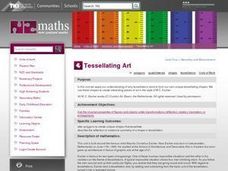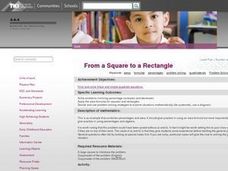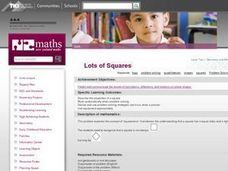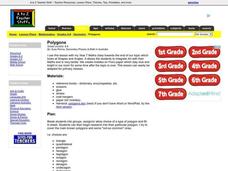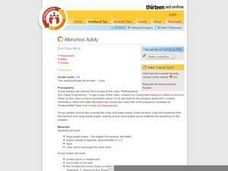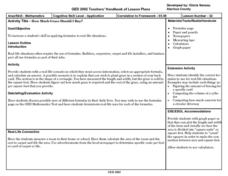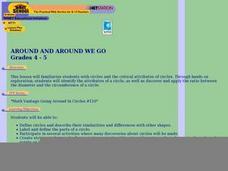Curated OER
Tessellating Art
Fourth graders create artwork showing their own unique tessellating shapes. They apply the symmetries of a regular polygon and describe the reflection or rotational symmetry of a figure or object. They share their art work with the class.
Curated OER
From a Square to a Rectangle
Eighth graders solve problems involving percentage increases and decreases. Using given percentages, 8th graders transform a square into a rectangle. They apply the area formulas for squares and rectangles.Students observe the percent...
Curated OER
Lots of Squares
Pupils work in pairs, to make a square on the geoboards with a rubber band (or draw one on the dot paper). It can be any size and in any location and share their answers with the class.
Curated OER
Moving On: Octagoning the Circle
Learners explore circles through the use of octagons. They inscribe a circle in a regular octagon and find the area and perimeter of the hexagon with respect to the radius of the circle. Students present their findings to the class.
Curated OER
Ship Shape
Second graders explore shapes and create a Silly Shape book. Students recognize that shapes have certain properties and be able to define them. Example, a triangle is any three-sided shape. Students' job is to make a picture on...
Curated OER
Square Pegs in Round Holes
Sixth graders problem solve the square peg in the round whole problem by applying knowledge of the formulas for the areas of the circle and the square. They decide on a problem solving strategy based on logical reasoning.
Curated OER
Angles in Art Lesson
Students examine the correlation between art and math. Using their computers, students construct and measure angles. Students identify the properties of angles and polygons. They engage in the Angles program on their Palm and use the...
Curated OER
Calculate It
Fourth graders find the area and perimeters of squares and rectangles using a calculator to check their multiplication. They use the appropriate formulas to find the area and perimeter of the given geometric shapes.
Curated OER
Characteristics of Polygons
Fourth graders discuss characteristics of polygons and organize and visualize those characteristics using Kidspiration. Students import pictures that demonstrate the characteristics and save their projects to be reviewed and graded by...
Curated OER
Polygons
Second graders view a PowerPoint presentation on Identifying Polygons by their number of sides and their individual properties. They separate polygon tiles into groups by their attributes.
Curated OER
Polygons
Middle schoolers work together to create mobiles with different polygons. They research the polygon and list its characteristics. They may present to the class if they chose to.
Curated OER
Don't Box Me In
Students explore the relationship between flat and three-dimensional shapes. They identify the names of 3-D shapes and construct cubes from squares.
Curated OER
Seeing Shapes
Students study a variety of geometric shapes by taking pictures of items representing the shapes with a digital camera. They identify the shapes by using software to paint on the image.
Curated OER
How Much Grass Should I Buy?
Students examine a variety of real life situations in which they must access information, select an appropriate formula, and calculate an answer. A rectangular piece of grass provides an opportunity for the exploration of this lesson.
Curated OER
Tunnel Traps
Students identify shapes that match specific shape descriptions involving a range of geometric terms and correct polygon names. They utilize a mathematics educational software program to gain practice.
Curated OER
Area graphics for 7th graders
Students randomly select dimensions for three geometric shapes (square, right triangle and circle). From the graphs they compare and contrast the graphical results of each shape.
Curated OER
Around and Around We Go
Fourth graders discover that a polygon is a closed figure formed by line segments, and that the perimeter of a polygon is the sum of the lengths of its sides. They utilize a worksheet imbedded in this plan to gain lots of practice with...
Curated OER
What Does It Take?
First graders study the attributes of circles, squares, triangles and rectangles. They sort shapes that are the same and those that are different into groups.
Curated OER
Polygons
Fourth graders identify and describe lines, shapes, and solids using formal geometric language. They use Inspiration to create a graphic organizer and outline of polygons.
Curated OER
Tessel Your Way to Nagano!: Olympics, Winter Sports, Snowboarding, Graphic Design, Geometry, Math, M.C. Escher, Tessellations
Students create Post-It note fundamental regions to tesselate. They make tesselations using computer software or websites. They create a jacket design with tesselation and determine the cost of production.
Curated OER
Elastic Band Shapes
Learners identify basic shapes (triangle, square, rectangle, circle), create shapes with different body parts, and create shapes at various levels (high, low)
Curated OER
Geometry in Tessellations
Students examine tessellations and their geometric properties. Students also develop a better understanding of lines, planes, angles, and polygons.


